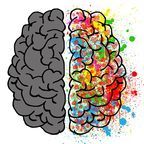This article really made me smile, because my own Meyers-Briggs would attest to this very strong leaning. The rest of the quadrants balance me out. If you take either the Myers-Briggs, or the Kiersey Temperament Sorter ( and I recommend doing it early in life, e.g., your teen kids), but even doing it in the early eighties, you will see how each of the "poles" will indicate how many people (in percentages) have those poles. So, when part of you feels a little different, you will discover that perhaps 8% of the people tested has that same result. Okay, so you are different, and in a really good way!
While simple, it is also paradoxically complicated. In any case, it is enlightening to take. Being honest with each question is, of course, necessary. Once you have taken the test/survey, the results rarely change. Over 40 years, mine have always been the same, with only two changes, e.g., as I was approaching and moving into retirement, I saw some changes. Yet, were they really changes? Or were they really the core of my personality, adjusted by school, marriage, kids, etc.? Fun to think about!
When my daughter was about 13, we took it at the same time. It was suppossed to be something to do on a rainy day. The results had me know my daughter in a very different way, and I was able to respect those differences, and to separate them from normal "teen angst". It was wonderful seeing her in that light ... the light of her real temperament.
The Kiersey and M-B are the most reliable, but there are a few others which were better designed for movie magazines. You might want to avoid those.
This article seems to be written with certain results being illuminated.
Being a deep thinker is a great gift as it allows you to delve into the very essence of things and be more conscious.
Still, in modern society with its materialistic consumer mentality, this constant inquiry and profound awareness that accompany being a deep thinker can be quite challenging.
Here are some struggles that only deep thinkers can relate to:
1. Feeling of detachment
In a world ruled by greed, primitive desires and material interests, where people’s intellectual, moral and spiritual level is constantly going down, it’s no surprise that deep thinkers often feel like they don’t belong here.
Sometimes, you just can’t understand other people and their actions, which makes you wonder why you are such a misfit and feel like you come from another planet.
2. You have no interest in mainstream culture and popular activities
Similarly with the feeling of detachment, you don’t resonate with the interests and aspirations that are common to the majority of people and don’t enjoy things everyone loves. Those popular TV shows everyone talks about or usual activities like going for shopping with your friends and talking about clothes only irritate you.
You often wonder how it’s possible to waste so much of time on the things that don’t really matter. In general, you have little or no interest in the mundane and material side of being.
3. You have a profound frustration with modern society
Whether you follow what’s happening in the world or not, the only thing is clear – you are quite pessimistic about the future of humanity. It’s all because you deeply realize that humankind is constantly moving away from the true values and the things that really matter. All this ignorance and superficiality of modern people often make you think that the human race is doomed.
4. Others confuse you for being arrogant/weird/absentminded
For the most part, deep thinkers are introverts who remain immersed in their thoughts most of the day and don’t open up to other people easily. For this reason, those who don’t know you well may get a wrong impression that you are full of yourself and are acting snobby, avoiding small talks and group activities.Some may think you are a weirdo or an absentminded daydreamer who just sits there and has his/her head in the clouds all day long.
5. The necessity to solve everyday problems can be a real challenge
You may have reflected on the questions that most people have never asked themselves and have read more books than anyone around you, but solving everyday problems can make you feel really helpless. The mundane aspects of being have never really interested you and your practical thinking skills are not that good, so you try to avoid dealing with such issues at any cost.
6. Periods of introspection and causeless sadness.
If you are a deep thinker, you are probably familiar with the feeling of sadness you may have from time to time for no obvious reason. It can be compared to depression of a sort. In these periods, you are just drawn into yourself, analyzing your life or reflecting on existential and esoteric issues. Nothing can really get you out of this state unless the flow of your thoughts comes to some conclusion.
7. Lack of understanding
When you have that thoughtful expression on your face, even your close ones may assume that something is wrong with you and start worrying about you, asking questions like “Is everything all right?” or “Are you ok?”
The problem is that it’s not always easy to explain the cause of this mood. It may be something as simple as a book with a sad ending or a thought-provoking documentary you recently watched – literally anything can put you in deep thoughts.
8. It can be difficult to get out of your head and return to reality
When you are reading a book or are simply immersed in your thoughts, it’s like if you were traveling to an alternate reality. A real struggle is when you have to come back to the “real” world and return to your job, everyday duties and activities. This return is always accompanied by a feeling of confusion and even frustration. Remember those mornings when you are having a beautiful dream and it is suddenly interrupted by the sound of the alarm clock? This is what it feels like when you realize it’s time to get out of your head and come back to the real life.
Anna LeMind
Anna is the founder and lead editor of the website Learning-mind.com. She is passionate about learning new things and reflecting on thought-provoking ideas. She writes about science, psychology and other related topics. She is particularly interested in topics regarding introversion, consciousness and subconscious, perception, human mind's potential, as well as the nature of reality and the universe.











Here’s what I say: Okay, so you’re not perfect. Guess what? You’re in great company. None of us is perfect. We all have pieces within us we want to improve or even remove. So, when we write, we write from a place of humility, honesty, and truth. We say things like, “As I write, I realize I have fallen short of who I really want to be. Hopefully, you will do better than I am doing.” Or, “I realize now that for much of my early life, I was living life as the person my parents wanted me to be, not as the person I wanted to be, and therefore I was not able to be as present to you as I would have liked, because I wasn’t even sure how to be present to myself.”